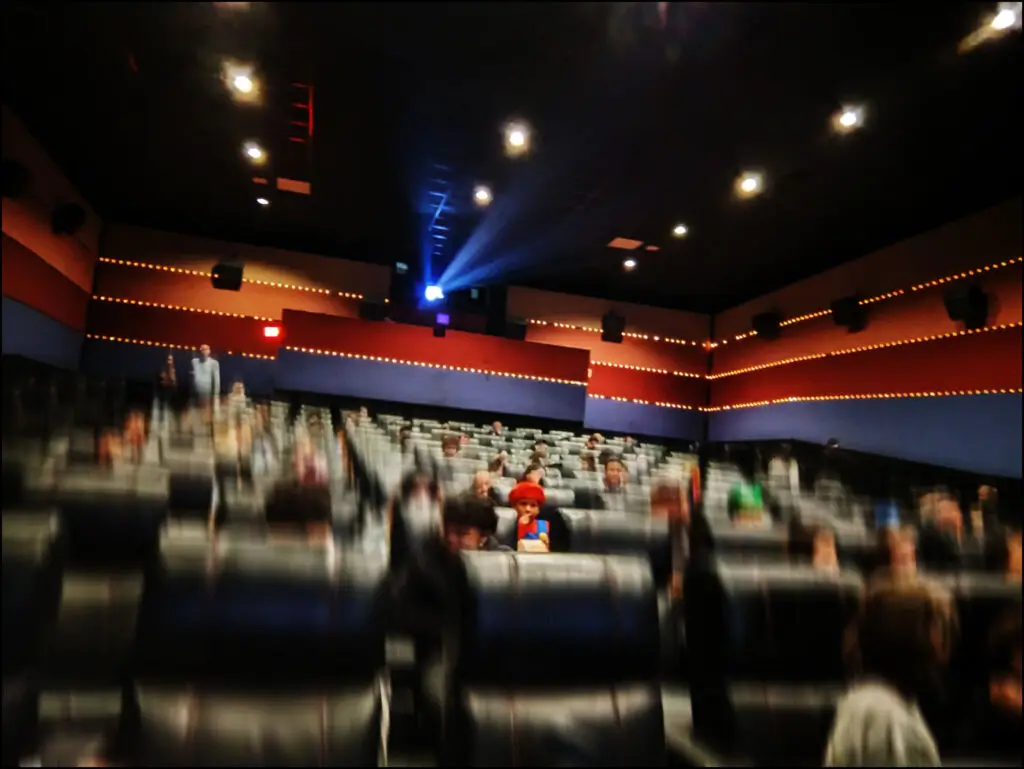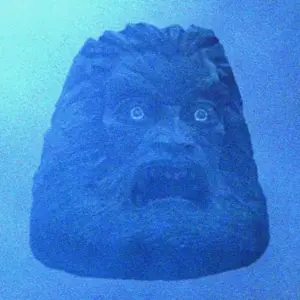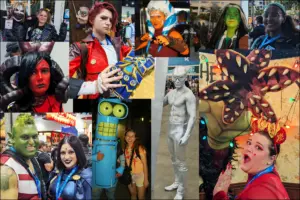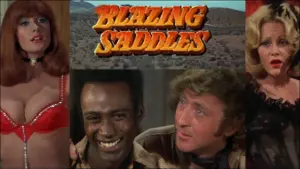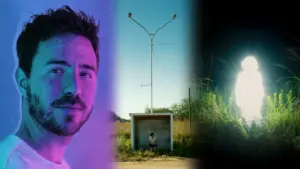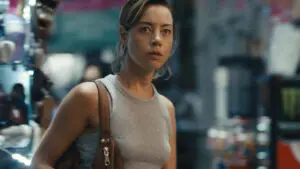If you’re thinking of seeing The Super Mario Bros. Movie, let me save you a couple of hours. If this movie were a videogame, you’d want to pull it out of the console and throw it at a cinder-block wall while videotaping it in slow motion to turn into a .GIF that you could post everywhere to get LOLs and giggles before smacking yourself about the face and then dipping your head in a vat of cold pudding.
Alas, it really is a movie, and as it turns out it’s designed like the hard plastic casing of an old game cartridge, or the spiked shell of a mean turtle: It’s review-proof. The entire movie has been engineered in a way where it doesn’t matter whether the story holds together or if scenes make sense. The thing has such a high level of competent mediocrity that no matter what you feel about the movie, it won’t damage the games themselves.
This is no-ambition film making. Unlike The Lego Movie, which sought to side-step Lego brick-play and become its own irreverent and inventive entity, the people who made The Super Mario Bros. Movie dutifully barfed out an ancillary product to the billion-dollar behemoth video games, which include “Donkey Kong,” “Mario Kart,” “Super Smash Brothers,” “Mario Odyssey,” all the “Super Mario” games, and whatever else is out there (“Super Mario Brothers Riding Donkey Kongs to Save Princess Peach From Stepping in Bowser’s Droppings While She’s High on Mushrooms” or whatever).
Looking on the Mario-related Video Game Sales Wiki, it says the sales power of all the games combined has generated more than $22 billion in revenue as of March 2022. Compare that to, for example, all the “Star Wars” movies, which have made roughly $10 billion, and you can see why The Super Mario Bros. Movie could have been directed by John Waters and consisted of just two hours of Mario flagellating himself with a cold string of spaghetti, and it would scarcely matter.
The actual movie is marginally better than that, in that it does its best to look and feel like a film thing that has a beginning, a middle, and an end (already a somewhat alien concept to anybody who plays the video games). We meet Mario and Luigi as brothers who have just started their own plumbing business in Brooklyn, New York. Inexplicably, they live together with their parents, in what appears to be a child’s bedroom. But they have mustaches and their own business, so perhaps they’re relatable to manscaping Millennials with student-loan debt who are unable to afford overpriced rental housing of their own. Otherwise their arrangements make little sense, and no, the kids watching the movie are unlikely to care.
I found it disturbing that Mario and Luigi’s parents insult and demean them over starting their own business. An early scene shows them at a large table with their stereotypical Italian-immigrant extended family, twirling their forks into spaghetti that has no sauce, meatballs, side dishes, or anything resembling actual food. Their relatives, as well as a neighbor, mock them for promoting their business with a home-made TV advertisement. What’s going on here? The Mario Bros. as emotionally abused man-children? No wonder most of the games are set in another galaxy.
Mario and Luigi get their first customer, an upscale couple who ask them to fix a leaky faucet. That job, which they accomplish swiftly, is turned into a disaster by a dog that attacks them, almost as if the filmmakers really wanted to make a movie about bad pets. Within these first 10 minutes of the story, the movie has already used up most of its stock facial expressions for the lead characters, which go from wide-eyed “Huh?” faces to basic smiles, winces, and emoji-like fear. No surprise, but it says something about the directors (Aaron Horvath and Michael Jelenic, cashing in on their success making “Teen Titans Go!”) that they don’t care how the scenes play out so long as they move forward to occasional video-game like sequences.
Every so often the 3-D world shifts to a side perspective, paying homage to the video games’ 2-D roots (such as the first 1981 game, Donkey Kong, or the 1983 Nintendo console game Super Mario). This first happens as Mario and Luigi run through a construction site to get to another plumbing job. Later, the game simulates the 3-D style games, after a major plumbing problem in Brooklyn that sucks them into a wormhole to the hallucinatory kingdoms that form most of the Mario gaming world.
That’s where the movie introduces us to Toad, Yoshi, and other cloying side characters the movie takes for granted its audience already knows. Normally I dislike movies going overboard with explanatory backstories, but “Super Mario Bros.” had me feeling nostalgic for such basic satisfactions, though no sooner do I ask myself “What’s Donkey Kong’s motivation?” than I feel shame for asking. Soon enough, Mario’s fighting Donkey Kong in an arena, racing a Kart along a rainbow, or saving Luigi from imprisonment in a chain-dangling cage over a lake of hot lava, and a chorus of children ooh and say, “I played this!”
The movie’s plot involves the villainous Bowser (a mean-spirited, cretinous, vaguely horny, horned turtle) and his attempts to not only take over Kingdoms but to court and marry the girl-power heroine Princess Peach, who might need Mario’s help if she can teach him to use power-ups. Princess Peach, like the Smurfette, is the only recognizable female in the entire world, and it’s tempting to wonder exactly how she and Bowser could consummate a marriage, given their asymmetric body sizes. Yes, I feel horrible and dirty for thinking of this.
The movie repeatedly jokes about the repetition of video games, while side-stepping the issue of the characters’ recurring deaths as they learn new skills. Bowser constantly threatens to kill characters, and presumably Luigi really will die for good if he’s dipped into lava, but thankfully the filmmakers aren’t quite sadistic enough to follow through (I recall at least one “Toy Story” and “Cars” sequel that doesn’t hold back when it comes to animated death, reportedly inspiring kids’ nightmares).
It’s weird how such big-name actors are cast in these roles, only to have their voices digitally altered into generic, well-enunciated, cut-scene dialogue. If you didn’t know Chris Pratt played Mario you wouldn’t recognize him, and Anya Taylor-Joy’s performance as Princess Peach could have been played by any of the thousands of skilled female vocal actors out there. The only voice that stands out is Bowser’s, during a scene where he plays piano and sings a rock ballad to Princess Peach that has the following lyrics: “Peaches, Peaches, Peaches Peaches Peaches,” and repeat. After a while it occurred to me, “Is this Jack Black?” and sure enough, it’s Jack Black, because why not, the guy is everywhere. Still, this brief, muted dose of Teen Titans Go! style irreverence is all that seeps through the cracks of this Mario Movie Product (TM). Teen Titans Go! set a high bar, with Michael Bolton singing a song called “Upbeat Inspirational Song About Life,” while Jack Black singing “Peaches” plunges to the low bar of irreverent ambition. Way to dive, directors.
There’s a history of animated children’s movies existing at two levels, simultaneously delivering slapstick kid stuff while slinging arch, adult-level comedy in zippy dialogue. This style became especially popular as more families bought VHS and DVD movies for home consumption, as adults who were subjected to repeated viewings found the movies far more tolerable with some winking, adult-reference material to reduce the films’ brain cell degenerative properties. The Super Mario Bros. Movie, blows that all off, and parents can just suffer under the $22 billion steamroller and let their grey matter be flattened into pancakes because a $22 billion industry means you’re irrelevant, people who want to appreciate a good film.
The Super Mario Bros. Movie doesn’t even have the satisfaction of being a bad movie. I looked for something to hate about it, and it denied me full-bloom irritation. The movie’s pacing feels metronomic, as if edited by artificial intelligence, and the movie plows forward like The Nothing, sucking away thought and imagination. Boom, a $22 billion industry has asserted itself.
Many of the kids and parents showed up in their Mario and Luigi costumes, with puffy red or green hats, suspenders, and grins on their faces. When the movie lagged, they seemed oblivious, turning to their candy snacks to prepare a rush during the next Mario game sequence. Weirdly, an adult couple without children sat near me at the last minute, and the burly, bearded man (who might have been a real-life Mario….maybe he exists, like Santa Claus off-season?) let out deep, inexplicable chuckles at many of the lame scenes throughout the film. Some people I just don’t understand.
As the movie ends, a mock-adorable blue star creature from the games, named Luma, chirps that now you’re left to contemplate the infinite void of empty existence, or something. It happens so fast you barely have time to register that maybe, after cashing their massive checks, the filmmakers hated themselves a little bit.

